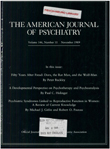Prevention of acute dystonic reactions in patients beginning high- potency neuroleptics [published erratum appears in Am J Psychiatry 1986 Sep;143(9):1204]
Abstract
The authors performed a prospective double-blind study of 39 inpatients beginning high-potency neuroleptics. Patients were randomly assigned to a 7-day course of benztropine or placebo in addition to a neuroleptic. Of 17 patients receiving placebo, eight (47%) suffered an acute dystonic reaction; of 22 patients receiving benztropine, none suffered this reaction--a highly significant difference. The authors also found minimal anticholinergic toxicity attributable to the addition of benztropine to the neuroleptic regimen. These results suggest that an initial 7-day prophylaxis with benztropine is a high-benefit, low-risk adjunctive treatment to neuroleptic therapy.
Access content
To read the fulltext, please use one of the options below to sign in or purchase access.- Personal login
- Institutional Login
- Sign in via OpenAthens
- Register for access
-
Please login/register if you wish to pair your device and check access availability.
Not a subscriber?
PsychiatryOnline subscription options offer access to the DSM-5 library, books, journals, CME, and patient resources. This all-in-one virtual library provides psychiatrists and mental health professionals with key resources for diagnosis, treatment, research, and professional development.
Need more help? PsychiatryOnline Customer Service may be reached by emailing [email protected] or by calling 800-368-5777 (in the U.S.) or 703-907-7322 (outside the U.S.).



